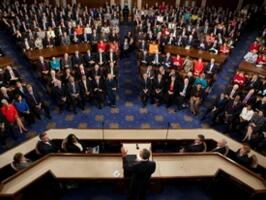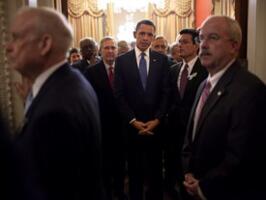State of the Union: Does Obama’s Agenda Divide Us?
A Commentary by Fran Coombs
President Obama acknowledged in his final State of the Union speech last night that “the rancor and suspicion between the parties has gotten worse instead of better” during his presidency, while at the same time speaking proudly of what he considers his greatest accomplishments. But for many voters, his accomplishments are exactly what have divided us.
Take Obamacare, perhaps the president’s signature achievement. The national health care law was passed by Congress in early 2010 without a single Republican vote, and the president and his party did little to encourage GOP support since they controlled both the House and the Senate. As Republicans have taken back control of Congress in the years since, they’ve repeatedly tried to roll back the law. Just in the last few days, the GOP-led Congress voted to repeal it, but the president vetoed that measure.
Most voters have never liked the health care law, and nearly six years after its passage, they still don’t. Only 11% want to keep Obamacare the way it is. Thirty-seven percent (37%) think Congress and the president should repeal the law and start over again, while half (49%) say they should go through the law piece-by-piece to improve it.
The cost of care has long been Americans’ number one health care concern, but most continue to believe that the new law will just keep driving up those costs while the quality of care will suffer.
The president downplayed the threat of terrorism in his speech, while at the same time championing his efforts to fight the radical Islamic State group ISIS, also known as ISIL. He also again cautioned Americans against “echoing the lie that ISIL is somehow representative of one of the world’s largest religions.” That religion went unnamed in Obama’s speech.
But 60% of voters disagree with the president and say the United States is at war with radical Islamic terrorism. Voters continue to feel the federal government is not devoting enough attention to the terrorist threat of radical Islam here at home.
In a survey just before last month’s terrorist massacre in San Bernardino, California, 49% said Islam as practiced today encourages violence more than most other religions, and 71% thought Islamic religious leaders need to do more to emphasize the peaceful beliefs of their faith.
Only 26% of voters now give the Obama administration good or excellent marks for the way it is handling ISIS. Fifty percent (50%) rate the administration’s tactics against ISIS as poor.
For national security reasons, most voters also disagree with the president’s decision to move tens of thousands of Syrian refugees, a by-product of the ISIS struggle, into this country.
U.S. voters aren’t worrywarts: Only 15% think it’s more dangerous to live here than in most other countries. But even before the recent terrorist attacks in Paris and San Bernardino, just 33% believed the United States is safer today than it was before the terrorist attacks on September 11, 2001. That ties the highest level of concern since Rasmussen Reports first began regular surveying of this question in November 2006.
This helps explain, too, why Americans are buying guns at a record pace, despite the president’s increased call for more gun restrictions.
Last night the president also issued a challenge: “…If anybody still wants to dispute the science around climate change, have at it. You will be pretty lonely because you’ll be debating our military, most of America’s business leaders, the majority of the American people, almost the entire scientific community and 200 nations around the world who agree it’s a problem and intend to solve it.”
Yet while most voters feel global warming is a major concern, just 23% agree that the scientific debate is over. They also want to make sure that whatever the government decides to do about global warming is a decision made by both the president and Congress, not Obama alone.
The president also boasted of the economic benefits of the growing energy sector, citing “the single biggest [government] investment in clean energy in our history.” Unmentioned, however, was fracking, the controversial oil and natural gas drilling process which has been by far the main source of energy growth – and which the Obama administration has been trying to limit because of environmentalist opposition. While most voters agree with the president that alternative energy sources are a better long-term investment, they also see fracking as an environmentally viable way to reach energy independence.
Obama seemed particularly proud of the economic gains made during his years in office. But half or more of voters have considered the U.S. economy unfair in general since early 2013. Most have consistently said the economy is unfair to the middle class, while generally viewing it as fair to women and minorities.
Just over half of voters also think the economy is unfair to people who work hard. The president champions government initiatives like raising the minimum wage and free community college to correct this economic unfairness, but voters argue that policies that expand the economy are more important than ones that promote fairness.
This is ultimately perhaps the biggest source of disagreement between the president and most voters. He generally sees government as the engine for change, while voters are more likely to think things work best when government gets out of the way.
The final poll on a presidency, however, is usually the election for his successor. The White House made clear in recent days that Obama’s final State of the Union was intended to set an agenda for future Democratic administrations, or as the president himself said last night, “For my final address to this chamber, I don’t want to just talk about next year. I want to focus on the next five years, the next 10 years and beyond. I want to focus on our future.”
It’s not a bad idea to look to the future when only 28% of voters think the country’s current direction is the right one.
Rasmussen Reports has asked voters if this year’s presidential election is a referendum on what the president has done in office or is it more about the future agendas of the two major political parties? We will release new numbers at 10:30 a.m. Eastern today.
Fran Coombs is the managing editor of Rasmussen Reports.
See Other Political Commentaries.
See Other Commentaries by Fran Coombs.
Views expressed in this column are those of the author, not those of Rasmussen Reports. Comments about this content should be directed to the author at fran.coombs@rasmussenreports.com
Rasmussen Reports is a media company specializing in the collection, publication and distribution of public opinion information.
We conduct public opinion polls on a variety of topics to inform our audience on events in the news and other topics of interest. To ensure editorial control and independence, we pay for the polls ourselves and generate revenue through the sale of subscriptions, sponsorships, and advertising. Nightly polling on politics, business and lifestyle topics provides the content to update the Rasmussen Reports web site many times each day. If it's in the news, it's in our polls. Additionally, the data drives a daily update newsletter and various media outlets across the country.
Some information, including the Rasmussen Reports daily Presidential Tracking Poll and commentaries are available for free to the general public. Subscriptions are available for $4.95 a month or 34.95 a year that provide subscribers with exclusive access to more than 20 stories per week on upcoming elections, consumer confidence, and issues that affect us all. For those who are really into the numbers, Platinum Members can review demographic crosstabs and a full history of our data.
To learn more about our methodology, click here.




